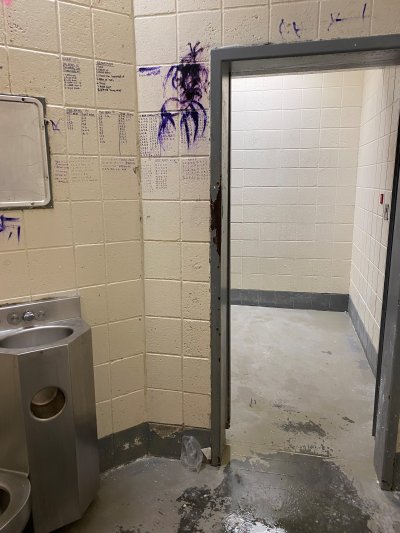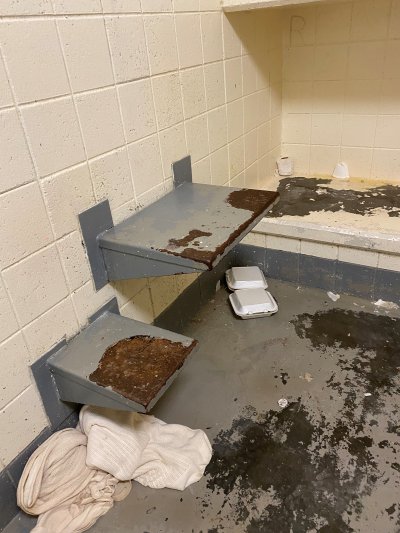A man who died of starvation and dehydration in an Arkansas jail after a year in solitary confinement should have been hospitalized long before he was discovered emaciated and unresponsive in his cell in August 2021, jail officials said in depositions for a legal suit that led to a $6 million settlement for his family.
Newsweek exposed the circumstances of Larry Eugene Price, Jr.’s death: emaciated, with shriveled hands and feet due to the standing water and urine in his jail cell and left to consume his own feces. He had been locked up because he had nobody to post $100 bail.
Price’s family reached a $6 million settlement Tuesday with Sebastian County, where he was incarcerated, and with Turn Key Health Clinics, the Oklahoma City-based company that provides the jail’s medical care. The parties, who did not admit any wrongdoing, will pay $3 million each. Erik Heipt, the Seattle-based attorney representing the Price family, said it was the largest jail death settlement in Arkansas history.
“We hope that this historic result sends a powerful message to every single jail and prison in America that this type of blatant disregard for human life will not be tolerated,” he said.
“Newsweek’s coverage of this case was thorough and outstanding and in depth, and it played a positive role in exposing the atrocity that occurred,” Heipt added.
Newsweek reviewed hundreds of pages of deposition transcripts, along with expert reports produced during the wrongful death lawsuit.
The 51-year-old’s suffering and death could only be compared to “instances of torture and non-consensual medical experimentation under the Nazi government in World War II,” according to a report by emergency physician Matthew DeLaney, an expert hired by the attorney representing Price’s family to review evidence in the case.
Price was often homeless, schizophrenic and had an IQ below 55 when he was arrested and jailed for walking into a small police station on August 19, 2020, and pointing his fingers like guns at officers while cursing and making threats. He was charged with felony terrorist threatening, but never got his day in court. The judge set bond at $1,000. He would have been released with $100 for bail, but he was destitute.
The 6-foot-2-inch man dropped from nearly 200 pounds to 120 pounds during his year-and-10-day stay in Sebastian County Jail.
“In a very real sense, he was ignored to death,” said Catherine A. Fontenot, a 30-year corrections expert, in her report after analyzing the evidence for the family’s civil suit.
Turn Key and the Sebastian County Sheriff’s Office did not immediately respond to a request for comment.

Courtesy of Erik Heipt
Price’s brother, Rodney Price told Newsweek he was happy about the settlement, but thought every day about how his brother had suffered. He voiced disappointment that no criminal charges were brought against the people responsible for Larry Eugene Price’s care.
“I’m angry at the system that had no initial accountability,” he said. “My brother’s case is so frustrating. I just don’t see how anyone in America, in any jail, state or federal prison, can resemble the visual look of my brother. I mean, basically, bones and skin and no accountability from any public officials.”
Overcrowding and Understaffing
The documents obtained by Newsweek show that senior staff at the jail said there was persistent overcrowding and understaffing. The last day Price was alive, his pod at the jail was staffed with seven detention deputies – 11 short of a fully staffed shift, according to a deposition with the assistant jail administrator.
They also confirmed a lack of medical and mental health monitoring of inmates in segregation. Additionally, jail staff typically were inexperienced, lacking training and supervision, according to the depositions with jail administrators.
“Throughout Mr. Price’s year-plus confinement, no medical or mental health providers conducted segregation rounds or checks on Mr. Price,” Fontenot wrote. “The practice of the Turn Key medical staff at the Sebastian County Jail was not to perform such checks, and the county did not arrange for any mental health providers to do so. Consequently, the only people who regularly observed Mr. Price were detention deputies with no medical or mental health training and who were merely looking for signs of life.”


Turn Key and jail administrators said that they had not done a deep investigation into the issues that contributed to Price’s death.
When asked if a thorough investigation was done to uncover potential policy violations, including interviewing the people involved beyond the night Larry died, Jail Administrator William Dumas said, “It is apparent that none of that was done.”
They also said few changes had been made to remedy the problems that led to his death. The main difference cited was deputies now bringing mental health care professionals to inmates in their cells instead of insisting inmates go to them. No one was disciplined in the case.
“I find the Sebastian County Jail’s failure to conduct a meaningful investigation into the death of Mr. Price shocking,” Fontenot wrote. “As a jail administrator, it’s almost inconceivable to me.”
Dumas and Assistant Jail Administrator Wyatt Wilson McIntyre said in response to questions during depositions that Price needed psychiatric care beyond what the jail could or would provide, that he was unfit for confinement, and that the jail was not equipped to safely confine him.
When asked if understaffing and overcrowding was problematic in the days leading up to Price’s death, and if the jail had become a dangerous place at that time, McIntyre said, “Yes.”
When asked if he ever tried to investigate to determine whether that dangerous situation played a role in Price’s death, he said, “No.” He later said that the entire jail staff did nothing to investigate how and why the death happened.
The deposition with the medical providers at the jail said that they did not follow up with Price’s care after it was discovered that he was refusing to take his antipsychotic medicine – and corrections officers never communicated to medical and psychiatric providers when Price’s dramatic weight loss was discovered, even after he asked for help, saying he felt sick and had lost weight.
When asked to answer ‘yes’ or ‘no’ to a series of questions about potential improvements made by Turn Key, Dr. Jawuan Lewis, Turn Key’s director of psychiatry, said that other than insisting Turn Key take over mental health, in addition to psychiatric medication management, no changes had been made. Specifically, he was asked if there had been changes to address mentally ill inmates who were not eating or drinking water; any changes to how they dealt with psychotic patients in solitary confinement; or any changes to how to care for patients who are refusing medication. Each time, he answered, “No.” His one visit with Larry Eugene Price lasted less than five minutes, according to the jail cell logs.
Psychotic, Delusional and Disengaged
Lewis also said that he knew Price was actively psychotic, delusional and disengaged and that he knew Price wasn’t taking his medication consistently, but that he made no effort to get Price transferred to a more appropriate facility, and never followed up after discontinuing Price’s antipsychotic medication roughly nine months before his death.
Lewis said he thought another company was doing regular checks and that he himself was not responsible for psychiatric medication management.

Courtesy Erik Heipt
Price’s family was unable to get in touch with him because the jail requires inmates to add friends and family to a list for phone calls and visits. Price, in active psychosis, was incapable of navigating that bureaucratic process, his brother said.
The official cause of death was malnutrition and dehydration, and the manner was listed in the autopsy report as natural. An investigation was done by the Arkansas State Police, which typically handles jail death incidents. All investigative materials were forwarded to the Sebastian County prosecuting attorney without state police weighing in on whether to seek criminal charges. State police sources said this is common. The prosecuting attorney wrote to the Arkansas State Police on January 5, 2022 that there was no basis to prosecute anyone or any entity in the case.
The lawsuit, filed in the Western District of Arkansas, asked for all compensatory and punitive damages under state and federal law for the suffering and death of Price, as well as for the grief and suffering of his family.
Heipt said that Americans tend to be horrified by reports of inmate abuses like those coming out of North Korea, China, and other countries, “yet, when it happens in our own backyard, it doesn’t seem to get a similar level of outrage. I do think it’s time for America to look in the mirror and start paying attention, to address those atrocities that are committed here on our own soil.”
Rodney Price said his brother deserves to be remembered for who he really was.
“He was very loving,” Rodney Price said. “He wanted to be loved. … He loved to dance. He loved to be around family. He was my big brother.”


